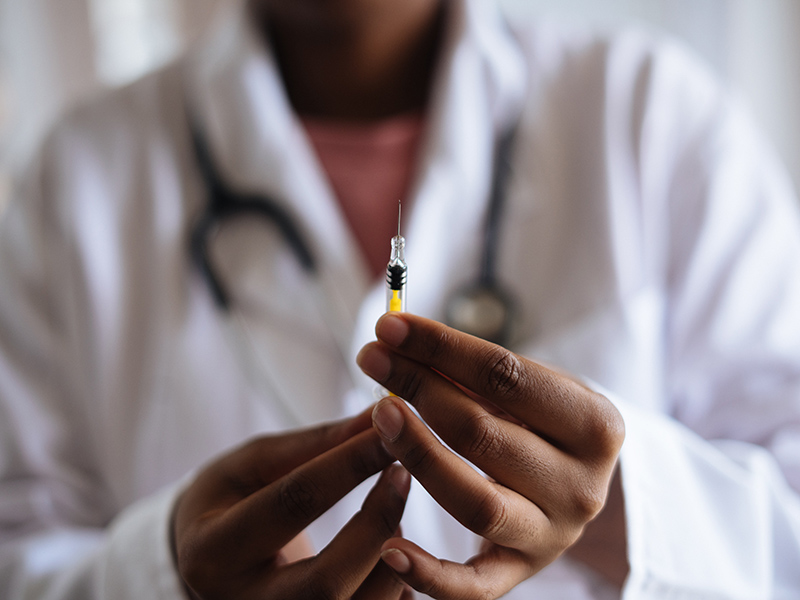21 Dec 2020
Coronavirus vaccines - are we there yet?

Over a week ago, Australia received the disappointing news that the University of Queensland SARS-CoV2 vaccine had been withdrawn as a potential vaccine solution for our current pandemic. This news came soon after the peer-reviewed release of data regarding the Pfizer vaccine and the Oxford vaccine.
The problem with the UQ vaccine was more one of perception rather than lack of effect or harm. The UQ vaccine used an innovative technology known as molecular clamping which selected part of the spike protein of the SARS-CoV2, which is the part of the virus that gains entry into the cells of the body. The problem of inducing an adequate immune response was overcome by using a non-infective portion of the HIV protein which enhances the efficacy of the molecular clamp vaccine.
Unfortunately, all participants in the phase 1 trials for this vaccine showed varying degrees of positivity to HIV, purely suggesting exposure to this particular protein but certainly not infection with HIV. The paradox of this is that it may even offer the people injected with the UQ vaccine some protection against developing HIV, although this is certainly unproven. But, a person being HIV positive in this scenario implies that it would be very difficult to decide whether they had developed a true HIV infection if they were exposed to the virus under different circumstances. This made the vaccine untenable and thus it was withdrawn.
So, does this affect in any way the Pfizer vaccine or the Oxford vaccine? In my view, the answer is a definite no. To summarise the peer-reviewed studies of both vaccines, the Pfizer vaccine had a 95% effectiveness rate as opposed to 90% effectiveness with the Oxford vaccine. Strangely for the Oxford vaccine, this higher effectiveness rate was only gained because of a mistake in around 2 1/2 thousand participants in the trial who were given a half dose of the vaccine initially and then 28 days later were given the full dose. For those given the full dose, the effectiveness was only 62%. Still very good for a vaccine.
Regardless of whether either of these vaccines are somewhere between 90 to 95% effective in stopping SARS-CoV2 infection, no patients in the trial receiving the active vaccine, experienced the severe version of COVID-19 or died from COVID-19 infection. This was opposed to a small proportion of people who received the placebo vaccination who did develop the concerning aspects of COVID-19.
The bottom line here is that both vaccines, which should be available in Australia around March and the Pfizer vaccine has already been rolled out in the UK in the last week, should be highly effective in vaccinating the population. Once we have achieved herd immunity (which is 70% of people being either exposed to the virus or vaccinated) then the virus should fizzle out over the following few months, once the 70% mark has been reached and, hopefully, our lives can return to normal.
Which vaccine would I have? My answer to this is-whichever one is available! The Pfizer vaccine is much more expensive than the Oxford vaccine to produce and store with the Pfizer vaccine requiring -70°C storage. The Oxford vaccine can be kept in a standard refrigerator. Also, in the peer-reviewed studies released, there was a much higher rate of minor side-effects with the Pfizer vaccine affecting around 50% of people who are vaccinated but the side-effects were short lived and very minor. The side-effects included fatigue, headache, muscle pain, chills, joint pain and fever. They only lasted for a few days and in almost all cases resolved promptly. But, I would still like to stress that I would have whichever vaccine is available & as soon as possible.
There are a number of people in society and many of these are not anti-vaxxers still concerned about having the SARS-CoV2 vaccine because it is claimed that this has been fast tracked and we are not certain about the long-term effects. One could argue this for many medical therapies but the reality is that the technology used to create these vaccines has been around for a number of years and purely re-purposed to suit the current coronavirus.
What we do know is that around 20% of people who develop COVID-19 become very ill, often require ventilators and around 3% may even die. The world has been seriously affected by this significant pandemic and until the vast majority of us are vaccinated, life will not return to normal.
If you make the decision to be vaccinated, you are not only protecting yourself against a potentially life-threatening illness but you also protecting the sicker, older and more vulnerable citizens who despite vaccination may even still develop the illness. What we need to do is eliminate SARS-CoV2 from the world and this can only be achieved through a safe, effective and widespread vaccination program.
As for all things relating to your health speak with your GP or a relevant medical professional. For your Financial Health contact PSK Financial Services on 9324 8888.
PSK Financial Services Group Pty Ltd (ABN 24 134 987 205) are Authorised Representatives of Charter Financial Planning Ltd (AFSL 234666), Australian Financial services Licensee and Australian Credit Licensee. Information contained in this article is general in nature. It does not take into account your objectives, needs or financial situation. You need to consider your financial situation before making any decisions based on this information.
